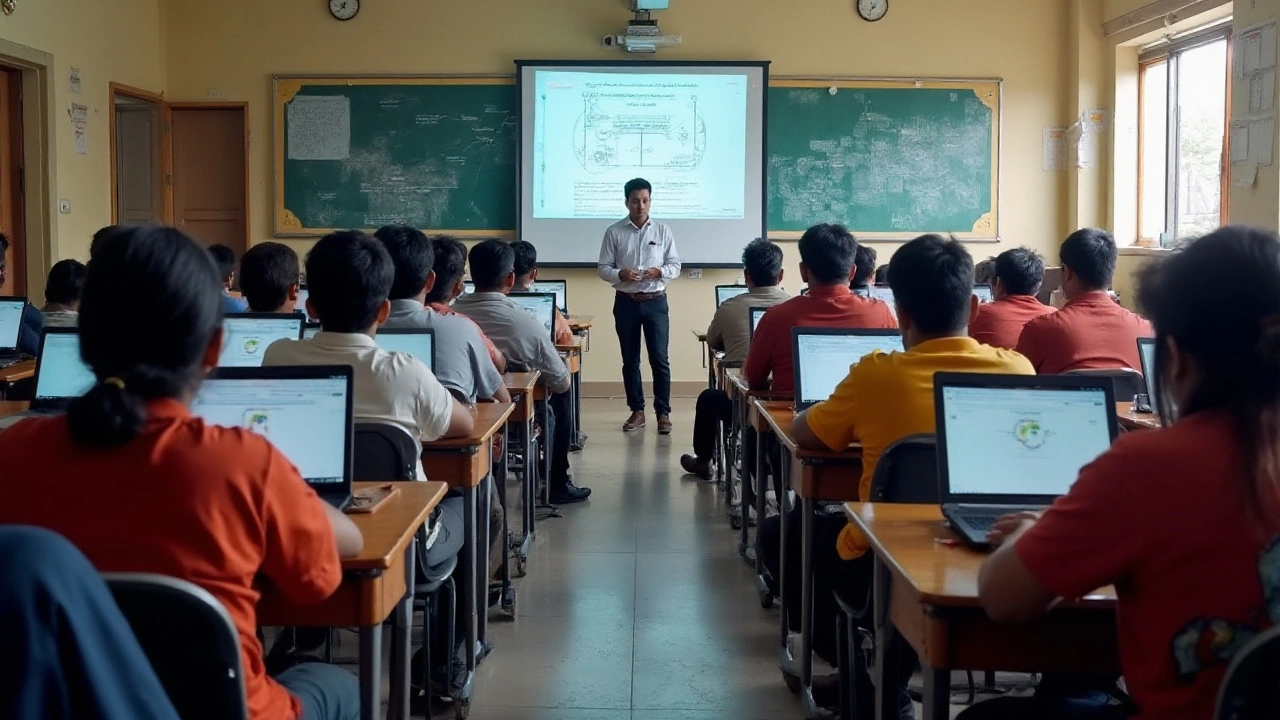Most Challenging Exams Worldwide: A Deep Dive
 Jan, 6 2025
Jan, 6 2025
There's something inherently captivating about the world of competitive exams. These assessments often serve as both gatekeepers and milestones, shaping the educational and career trajectories of countless individuals worldwide. While some exams are notorious for their difficulty, others are esteemed for the prestige they confer upon successful candidates.
From the nerve-wracking intensity of medical entrance exams to the intricate demands of global professional certifications, we explore the various facets of these demanding tests. In navigating this landscape, you'll find stories of resilience, strategic preparation, and the indomitable human spirit striving to conquer some of the toughest academic and professional challenges on the planet.
- Understanding the Nature of Competitive Exams
- The Most Challenging Exams Around the World
- Crucial Skills and Knowledge Required
- Strategies for Exam Preparation
- Impact of Competitive Exams on Careers
Understanding the Nature of Competitive Exams
In the realm of competitive exams, the inherent challenge is not just about the questions asked but the multitude of skills and knowledge they demand. As global educational standards continue to rise, these exams have become a defining feature in the landscape of academic and professional achievement. Typically, competitive exams encompass a broad range of subjects, requiring candidates to showcase proficiency in diverse fields, from analytical reasoning and quantitative aptitude to language skills and domain-specific knowledge.
The structure of these exams often includes multiple-choice questions, problem-solving exercises, and occasionally essays or case studies to evaluate a candidate's depth of understanding. Many candidates spend years preparing, utilizing a variety of resources including textbooks, online courses, and coaching centers, all in pursuit of that coveted top percentile.
The Psychological Aspect
Beyond the technicalities, competitive exams test endurance, resilience, and composure under pressure. Candidates might face psychological hurdles such as stress and anxiety. Maintaining mental balance is crucial, for a distracted mind can easily misinterpret questions or overlook key instructions. In fact, the pressure is often so intense that many institutions offer counseling services to help candidates manage their stress levels during preparation.
"The mind is not a vessel to be filled, but a fire to be kindled." - PlutarchThe ability to roadmap one's preparation journey is another key aspect of succeeding in these examinations. Developing a strategic study plan that prioritizes sections based on personal strengths and weaknesses is pivotal. This not only maximizes efficiency but also instills a sense of confidence as exam day approaches.
Global Variations
It's fascinating to see how the nature of competitive exams can vary across different countries and cultures. In India, for example, exams like the IIT-JEE and UPSC demand an astonishing level of dedication, often becoming a cultural phenomenon given the prestige associated with them. Meanwhile, in the United States, exams such as the GRE or LSAT serve as gateways to graduate education, with each testing specific skills pertinent to future academic success. These examinations are not just tests but are seen as pathways to career advancement, often opening doors to scholarships, advanced studies, and prestigious job positions around the globe.
Toughest exams often impose strict time limits, challenging candidates to answer accurately while racing against the clock. The pressure to perform within these tight timeframes is intentionally designed to reflect real-world scenarios where quick, informed decision-making is essential. Some of these exams also involve negative marking, where incorrect answers can result in loss of points, further intensifying the requirement for precision and cautious approach in answering.
The Most Challenging Exams Around the World
When we talk about the toughest competitive exams, several names instinctively arise, each with its own storied reputation. The Indian Institutes of Technology Joint Entrance Examination (IIT-JEE), for instance, stands as a colossal challenge for its candidates. Every year, more than a million students vie for a limited number of seats, with only a fraction succeeding. The rigorous physical and academic preparation required makes it an ordeal in both stamina and intellect.
The Chinese gaokao, by comparison, is no less demanding, often described as a make-or-break moment in Chinese students' lives. Held annually, this national higher education entrance examination demands intense dedication. The level of subject efficiency required, intertwined with its critical importance for university admissions in China, leaves little room for error. It's a test not only of academic knowledge but also of the mental fortitude given its impact on young students' futures.
Across the ocean, the United States too presents its own set of elite challenges with tests such as the Medical College Admission Test (MCAT) and the bar examination for aspiring lawyers. These exams don’t just review candidates' knowledge but delve deeply into their analytical abilities and capacity under pressure. The bar exam, particularly famed for its sheer breadth of legal knowledge required, has been a crossroads for many dreaming to practice law.
In the professional arena, Chartered Financial Analyst (CFA) exams rank among the toughest in the finance world. This series of three exams boasts a pass rate that hovers around a perilously low 40%, signaling not only the depth of knowledge required but the exhaustive dedication over several years. Like all of these toughest exams, the CFA demands not just study but sacrifice, as candidates often juggle rigorous study schedules alongside full-time work commitments.
| Exam | Country | Passing Rate |
|---|---|---|
| IIT-JEE | India | Approximately 10% |
| Gaokao | China | Varies significantly by region |
| MCAT | United States | About 50% |
| CFA | Global | Around 40% across all levels |
Yu Hua, a renowned Chinese author, once wrote:
"For many students, this is more than an exam; it feels like the only opportunity to secure a better future."His words resonate with the weight these exams carry globally. They are not just assessments but pivotal events that impact dreams, careers, and life trajectories.

Crucial Skills and Knowledge Required
When it comes to excelling in competitive exams, the foundation often lies in a blend of essential skills and comprehensive knowledge. These exams are structured not just to test rote memorization, but to assess critical thinking, problem-solving abilities, and the depth of understanding across various subjects. Candidates aiming to conquer such challenges must develop a well-rounded skill set that includes analytical prowess, effective time management, and adaptability to embrace new concepts. The sheer breadth of knowledge required is often vast, covering specialized topics depending on the nature of the exam, whether it be for educational purposes or professional certifications.
To thrive in this competitive realm, aspiring examinees must hone their analytical skills. Questions designed in these assessments frequently require application of theories and concepts to real-world scenarios, urging candidates to think beyond the textbooks. This necessitates a habit of consistent self-study, active learning, and engagement with the subject matter. Additionally, building a strong foundation in topics like mathematics, language and comprehension, and science often plays a key role. For instance, the challenging nature of standardized tests such as the GRE or LSAT often emphasizes logical reasoning and quantitative analysis, pushing future professionals to polish these abilities.
Strategic Time Management
A crucial and often underestimated skill is time management. With limited time to answer numerous questions, candidates must strategize efficiently, deciding how much time to allocate to each section without sacrificing accuracy. Practicing old papers and simulated tests can help students track their progress and tailor their pace accordingly. A saying goes, 'Failing to plan is planning to fail'—a motto worth considering when preparing for any daunting exam. Having a strategy in place reduces anxiety, ensuring candidates can adequately address each question within the time constraints imposed by the exam format.
In addition to cognitive skills, content knowledge remains paramount. Many competitive exams, especially those for entrance into universities or specialized careers like medicine or engineering, cover topics extensively. Consequently, aspirants should immerse themselves in a wide array of subjects, ensuring they are conversant with the latest developments and fundamental principles in their field of interest. For example, the Indian Civil Services Examination, probably one of the toughest exams in the world, demands that examinees be well-versed in subjects ranging from history and geography to economics and political science. A broad yet deep comprehension of such diverse topics is critical to tackle the challenges these exams pose.
According to Einstein, 'Education is not the learning of facts, but the training of the mind to think.' This perspective resonates deeply with the philosophies underlying competitive examinations, where the ability to think critically and innovatively is often the key to success.
Ultimately, each competitive exam has its own unique set of challenges, making it imperative for candidates to identify and cultivate the skills most relevant to their targeted exam. The more one understands the specific demands of the test, the better they can prepare, ensuring that when the exam day arrives, they are armed with not just knowledge, but a robust strategy to showcase their full potential.
Strategies for Exam Preparation
Preparing for competitive exams can feel like an uphill battle, especially when faced with the prospect of global benchmarks that demand everything from critical thinking to specialized knowledge. The stakes are high, and the pressure can be immense. However, with the right strategies, you can transform this daunting task into a manageable and rewarding journey. One of the most effective approaches is to establish a structured study routine that aligns with your personal strengths and learning style. Integrate varied learning materials such as books, online resources, and practice tests to create a well-rounded preparation plan. In doing so, you're not only diversifying your study approach but also enhancing retention and understanding of complex concepts.
Time management is another cornerstone of successful preparation. Create a detailed schedule that breaks down your study sessions into manageable chunks, ensuring regular breaks to avoid burnout. This approach not only helps maintain focus but also reduces the risk of cramming as exam day approaches. It's a strategy that has been endorsed by many successful candidates who emphasize the importance of maintaining a balanced lifestyle. For instance, integrating physical activity and leisure time into your routine can significantly boost productivity and mental clarity.
One study habit that frequently emerges in discussions about academic challenges is the practice of active learning. This involves engaging with the material in dynamic ways, such as teaching the concepts to someone else or applying the knowledge to real-world scenarios. Research indicates that such strategies deepen understanding and make recall easier during the actual exam. Additionally, participating in study groups offers the dual benefit of collaborative learning and moral support, both of which are critical elements for many individuals navigating the rigors of competitive exams.
"Success in an exam isn't just about how much you know; it's about how you manage what you know," says Angela Duckworth, a prominent psychologist who studies grit and perseverance.
Embracing technology can also be a game-changer in your exam preparation. Utilize educational apps and online platforms that offer interactive quizzes, video tutorials, and virtual flashcards. These tools are particularly advantageous for those on the go, allowing you to turn idle moments into productive learning opportunities. By leveraging technology, you can access a wealth of resources tailored to various toughest exams, ensuring that you're preparing with the latest and most relevant materials.
Stress Management Techniques
No discussion on exam preparation would be complete without addressing the inevitable stress that accompanies it. Proactively managing stress is crucial, not only for your mental well-being but also for optimal performance. Techniques such as meditation and mindfulness exercises can substantially decrease anxiety levels, promoting a calm and focused mind. Creating a serene study environment and establishing a pre-exam night routine can further enhance your readiness. For many, guided breathing exercises have been particularly effective in keeping last-minute jitters at bay.
Global exams push boundaries, testing not only academic prowess but also personal resilience. With the proper strategies and mindset, every challenge becomes an opportunity to learn and grow. As you embark on this journey, remember that perseverance and adaptability are your greatest allies in the quest to conquer any competitive exam.

Impact of Competitive Exams on Careers
Competitive exams often serve as pivotal checkpoints in one's career journey, marking significant transitions and opening new doors of opportunity. These exams typically require candidates to demonstrate their knowledge, problem-solving abilities, and perseverance, propelling them toward their professional aspirations. One can say that excelling in such exams often lays the groundwork for a promising career, providing a distinct advantage in a crowded labor market. Successful candidates frequently find themselves reaping rewards such as scholarships, coveted admissions in prestigious universities, lucrative job offers, or even leadership roles in their chosen fields.
The importance of competitive exams is pronounced in various sectors, each with its distinct reputation and level of challenge. Take, for instance, the medical field, where exams like the MCAT in the United States or NEET in India act as gateways to becoming qualified healthcare professionals. In the sphere of finance, the CFA (Chartered Financial Analyst) program is revered for its rigor, attracting individuals aiming to excel in investment management and financial analysis. These exams don't just assess technical knowledge; they also evaluate the candidates' aptitude for critical thinking and strategic decision-making, essential traits in highly competitive fields.
"Success is not final, failure is not fatal: It is the courage to continue that counts." - Winston S. Churchill
Moreover, the societal perception of an individual who has excelled in such examinations can significantly enhance their professional image and credibility. In many cases, a person distinguished by accolades in competitive exams can navigate their career path with a sense of confidence and recognition that others may lack. This recognition often leads to more rapid career progression, as employers and colleagues tend to appreciate the dedication and resilience exhibited by such individuals. Consequently, these exams often serve as formative experiences, equipping candidates with the stamina and skillset to tackle complex professional challenges with aplomb.
Globally recognized competitive exams often set the standard for academic and professional excellence, making them benchmarks for others in the industry. They foster an environment of intellectual rigor and innovation, encouraging candidates to push the bounds of their knowledge and capabilities. This drive for continuous improvement not only elevates the individual but also benefits the organizations and communities they become a part of, driving growth and advancement across sectors. As such, the influence of these exams extends beyond personal achievement, making a notable impact on industries and society as a whole.